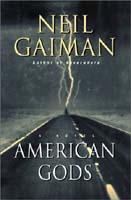American Gods
(This review originally appeared in Mythprint 38:9 (#234) in September 2001.)
Reviewed by Matthew Scott Winslow
One of those classic lines from Shakespeare that most all of us had to memorize at some point in our education is Gloucester’s claim in King Lear, IV, i, that ‘As flies to wanton boys are we to the gods,/They kill us for their sport.’ In his latest outing, American Gods, Neil Gaiman reverses that sentiment and looks not at our relationship to the gods, but their relationship to us.
The story opens with the protagonist, Shadow, about to be released from a three-year stint in prison. Days before his parole, however, he discovers that his wife and best friend have both died in a car accident, and so his parole has been brought forward a few days. On his way home to the funeral, Shadow meets up with Mr. Wednesday, who knows a bit too much about Shadow, and offers him a job as his bodyguard. Shadow, with nothing to lose, accepts.
Shadow is then catapulted into a bizarre world where the gods truly do exist, but their power is dependent upon the belief of the hoi polloi. As the common man turns his belief to other things, the power of the gods diminishes. Shadow quickly discovers that he has thrown his towel in with the gods of myth and legend who are preparing for a massive battle against the modern gods of TV, media, and Internet. To rally the forces, Mr. Wednesday takes Shadow on a road trip that will cover not only a great portion of the American mid-west, but the pantheons of many cultures. Shadow encounters the brutal Czernobog, the dapper Mr. Nancy, seductive Easter, mortuary-owner Mr. Ibis, and many others.
The modern gods, however, are not content with just gathering their forces, but they begin attacks of guerilla warfare against the old gods in their quest to become the sole American gods of the title. And so, with the gauntlet thrown, the book hurries toward the breaking of the storm (both literal and figurative) as Shadow discovers why all the gods are so interested in him and why the conflict seems so inevitable.
American Gods is mythopoeic in the same way that That Hideous Strength is mythopoeic: it does not necessarily make myths wholesale as a secondary creation (as Tolkien did), but it creates new myths from the fabric of the old. As Lewis brought Merlin into the twentieth century, so also does Gaiman bring the pre-Christian pantheons into the twenty-first century. The result is compelling, but also aggravating at times. Gaiman spends the first two-thirds of the book developing the differences between the old and new pantheons, but when the plot takes an unexpected turn, the tension between the gods disappears as if it were never there in the first place.
But that one complaint aside, Gaiman has written an engaging book that is sure to provide much fodder for discussion within discussion groups in the year to come, and I wouldn’t be surprised to see it showing up in many award lists for 2001.
Gaiman, Neil. American Gods. New York: William Morrow, 2001.

